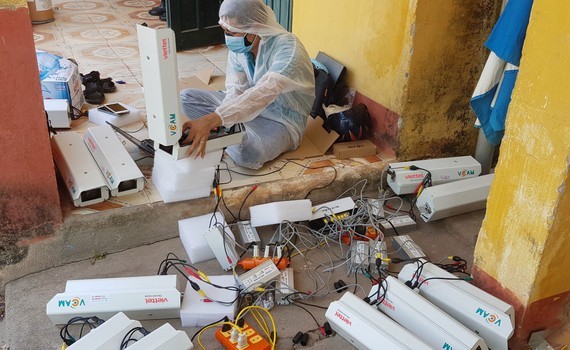
At the end of April 2021, in response to the urgent demands of fight against Covid-19 in Vietnam, the Ministry of Information and Communications (MIC) issued the ‘Instruction for Using the Solution Set to Support Covid-19 Prevention and Tracing in the Community’.
This document explains in details the use of domestic solutions based on advanced technologies, combined with propaganda campaigns and administration methods of the local authorities. It mentions Bluezone – an application for close contact detect, VHD – an app for online medical status declaration for people entering Vietnam, NCOVI – an app for online medical status declaration for people residing in Vietnam, a system to record check-in and check-out at public places throughout the nation, and a digital map for Covid-19 fight updates.
At the beginning of May, MIC continued to release a formal document to the People’s Committees of all provinces and municipalities regarding the installation of monitoring camera systems in centralized isolation areas to ensure medical regulations are strictly obeyed.
Accordingly, MIC assigned Viettel Group and VNPT Group to be responsible for this camera installation task. They had to cooperate with the localities to finish this task as soon as possible. 3,000 cameras were then successfully set up in centralized isolation locations in the Northern regions. Viettel Group also added another batch of 1,000 cameras in 5 days at 125 communes of Bac Giang Province, the hot spot of the latest Covid-19 outbreak in Vietnam.
All images recorded by these cameras are sent to and processed at the Covid-19 Operation Center, which stores them with a cloud-based service so that all regions in the country can access them 24/7, helping them timely tackle any possible problem arisen.
Recently, MIC has proposed the use of a special digital bracelet on isolated people to the National Steering Committee for Covid-19 Prevention and Control. This method has already been used in many nations, and has proved its usefulness.
MIC, therefore, suggested the use of similar made-in-Vietnam digital bracelets that apply GPS technology to record the locations where quarantined or isolated people visit. Thanks to a long-lasting battery of 30 days, the device can send warning signals to the operation center whenever monitored people try to destroy them or to get out of the quarantined zone.
MIC asked the permission to assign certain domestic technological enterprises to develop these practical devices using the fund raised from the community. These kinds of equipment should be ready 4 weeks after project approval. They have the two main features of detecting close contact via Bluetooth Low Energy (BLE) technology and checking the rule observation of wearers via GPS technology.
This digital bracelet can amend the situation when monitored people do not own or bring along a smart device, they purposely turn off the Bluetooth function on their smart devices.
























